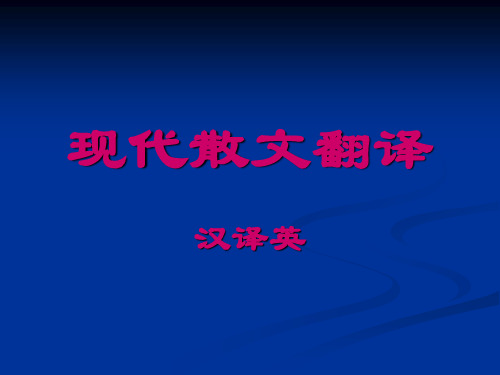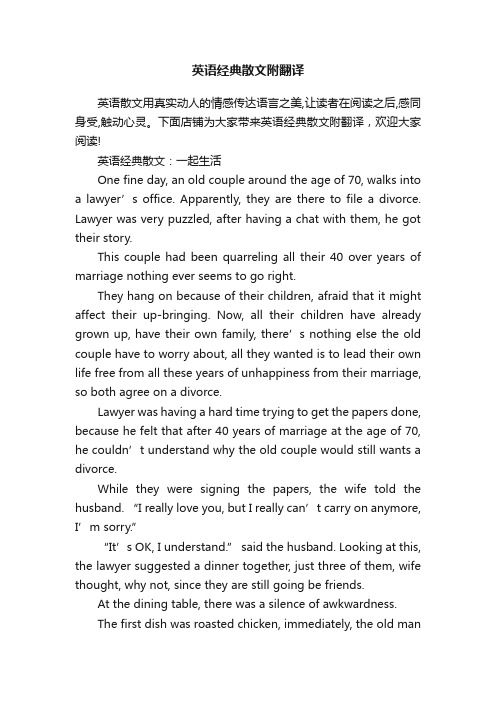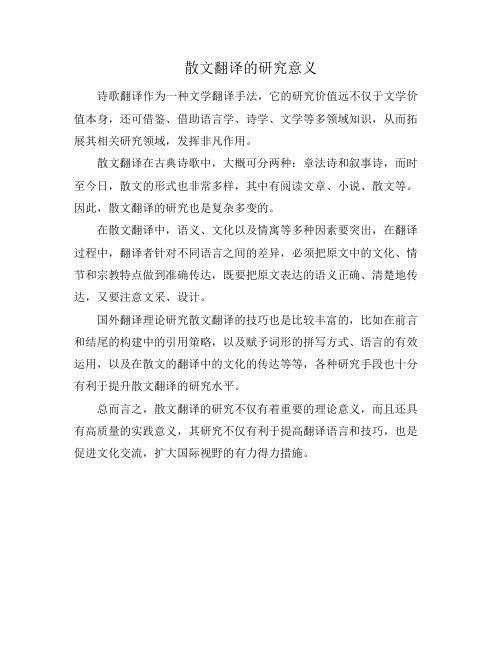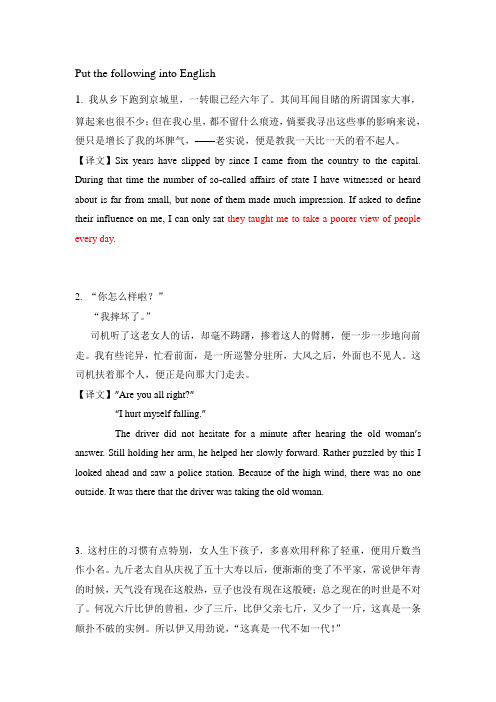散文翻译
现代散文翻译(汉译英)

I am on my own. strolling. hands behind my back. This bit of the universe seems in my possession now; and I myself seem to have been uplifted from my ordinary self into another world, I like a serene and peaceful life, as much as a busy and active one; I like being in solitude, as much as in company. As it is tonight, basking in a misty moonshine all by myself. I feel I am a free man, free to think of anything, or of nothing. All that one is obliged to do. or to say, in the daytime, can be very well cast a side now. That is the beauty of being alone. For the moment, just let me indulge in this profusion of moonlight and lotus frafragrance.
现代散文翻译
汉译英
荷塘月色
朱自清
荷塘月色
这几天心里颇不宁静。今晚在院子里坐着 这几天心里颇不宁静。 乘凉,忽然想起日日走过的荷塘, 乘凉,忽然想起日日走过的荷塘,在这满 月的光里,总该另有一番样子吧。 月的光里,总该另有一番样子吧。月亮渐 渐地升高了,墙外马路上孩子们的欢笑, 渐地升高了,墙外马路上孩子们的欢笑, 已经听不见了;妻在屋里拍着闰儿, 已经听不见了;妻在屋里拍着闰儿,迷迷 糊糊地哼着眠歌。我悄悄地披了大衫, 糊糊地哼着眠歌。我悄悄地披了大衫,带 上门出去。 上门出去。
英语经典散文附翻译

英语经典散文附翻译英语散文用真实动人的情感传达语言之美,让读者在阅读之后,感同身受,触动心灵。
下面店铺为大家带来英语经典散文附翻译,欢迎大家阅读!英语经典散文:一起生活One fine day, an old couple around the age of 70, walks into a lawyer’s office. Apparently, they are there to file a divorce. Lawyer was very puzzled, after having a chat with them, he got their story.This couple had been quarreling all their 40 over years of marriage nothing ever seems to go right.They hang on because of their children, afraid that it might affect their up-bringing. Now, all their children have already grown up, have their own family, there’s nothing else the old couple have to worry about, all they wanted is to lead their own life free from all these years of unhappiness from their marriage, so both agree on a divorce.Lawyer was having a hard time trying to get the papers done, because he felt that after 40 years of marriage at the age of 70, he couldn’t understand why the old couple would still wants a divorce.While they were signing the papers, the wife told the husband. “I really love you, but I really can’t carry on anymore, I’m sorry.”“It’s OK, I understand.” said the husband. Looking at this, the lawyer suggested a dinner together, just three of them, wife thought, why not, since they are still going be friends.At the dining table, there was a silence of awkwardness.The first dish was roasted chicken, immediately, the old mantook the drumstick for the old lady. “Take this, it’s your favorite.”Looking at this, the lawyer t hought maybe there’s still a chance, but the wife was frowning when she answer. “This is always the problem, you always think so highly of yourself, never thought about how I feel, don’t you know that I hate drumsticks?”Little did she know that, over the years, the husband have been trying all ways to please her, little did she know that drumsticks was the husband’s favorite.Little did he know that she never thought he understand her at all, little did he know that she hates drumsticks even though all he wants is the best for her.That night, both of them couldn’t sleep, toss and turn, toss and turn. After hours, the old man couldn’t take it anymore, he knows that he still loves her, and he can’t carry on life without her, he wants her back, he wants to tell her, he is sorry, he wanted to tell her, “I love you.”He picks up the phone, started dialing her number. Ringing never stops. He never stop dialing.On the other side, she was sad, she couldn’t understand how come after all these years, he still doesn’t understand her at all, she loves him a lot, but she just can’t take it any- more. Phone’s ringing, she refuses to answer knowing that it’s him. “What’s the point of talking now that it’s over. I have asked for it and now. I want to keep it this way, if not I will lose face. “She thought. Phone still ringing. She has decided to pull out the cord.Little did she remember, he had heart problems.The next day, she received news that he had passed away. She rushed down to his apartment, saw his body, lying on thecouch still holding on to the phone. He had a heart attack when he was still trying to get thru her phone line.As sad as she could be. She will have to clear his belongings. When she was looking thru the drawers, she saw this insurance policy, dated from the day they got married, beneficiary is her. Together in that file there’s this note.“To my dearest wife, by the time you are reading this, I’m sure I’m no longer around, I bought this policy for you, though the amount is only $100k, I hope it will be able to help me continue my promise that I have made when we got married, I might not be around anymore, I want this amount of money to continue taking care of you, just like the way I will if I could have live longer. I want you to know I will always be around, by your side. I love you.”Tears flowed like river.When you love someone, let them know. You never know what will happen the next minute. Learn to build a life together. Learn to love each other for who they are,Not what they are.英语经典散文翻译:在一个阳光明媚的日子里,一对70多岁的老夫妇走进了律师事务所。
散文翻译的价值

散文翻译的价值以“散文翻译的价值”为标题,本文将讨论散文翻译的重要价值,以及如何实现这一价值。
什么是散文翻译?散文翻译是指将某种外文的散文由原文译成另一种语言的过程。
相比于技术翻译,散文翻译更加复杂,需要翻译人员将句意准确的表达出来,而不是直译。
由于原文中的文字传达的含义更加的抽象,所以翻译人员更加需要深入领会原文,使其能够恰当的传达给读者。
让我们来看看散文翻译有什么价值:首先,散文翻译可以帮助文学爱好者更加深入的了解外文文学。
外文文学是人们认识另一种文化的有力工具,而通过散文翻译,人们可以更加深入的领会外文文学中暗含的文化价值观,进而有助于我们更加深入的认识外文文学。
其次,散文翻译也可以帮助我们在跨文化的交流中节省大量的时间和精力。
通过散文翻译,我们可以把原文的信息迅速地翻译过来,使得我们能够在有限的时间里获取大量的有用信息。
再次,散文翻译可以帮助我们在跨语言的学习过程中更加熟练地掌握另一种语言。
散文翻译可以帮助读者理解难以理解的文学文本,并且更加洞察跨语言文字逻辑,从而使得学习另一种语言变得更加容易。
最后,散文翻译也可以帮助我们更好的理解世界文学智慧的深层精髓。
外文的散文虽然精髓,但可能难以理解,而有了散文翻译,我们就可以更好的理解外文散文中深层次的文学智慧,并从中获得一些启发。
总之,散文翻译具有重要的价值,但要实现这一价值,翻译人员也需要具备一定的技能和素养,这就要求翻译人员要熟悉双方语言,并有较强的文学素养和文学理解能力。
在此基础上,翻译人员还要掌握文学翻译的技巧,这样才能更好的实现散文翻译的价值。
因此,本文从一开始就讨论了散文翻译的价值,以及如何实现这一价值,以期能够帮助读者更好地理解散文翻译及其重要价值。
散文翻译的特点和难点

散文翻译的特点和难点散文翻译的特点和难点散文翻译是文学翻译的重要分支之一,它不同于小说、诗歌翻译,散文的编排和写作方式要灵活多变,其独特的语言风格和情感表达方式也给翻译工作带来了多种难点和挑战。
因此,本文将从特点和难点的角度探讨散文翻译的具体问题。
一、散文翻译的特点1.灵活多变散文翻译不同于固定结构的小说和诗歌,它没有固定的韵律和格律,更容易使翻译者在翻译时产生死板的感觉。
因此,散文翻译需要翻译者有较高的语感、文化理解和审美素养,使其真实而自然地传达原文的内容及情感。
2.简洁明了散文翻译在表达上非常简单明了,意义清晰,一般不太使用复杂的词汇句式。
散文的短小精悍、简洁而有力的表述,给翻译带来了相对困难。
3.生动鲜活散文翻译通常具有生动而鲜活的叙述,通常包括多个情感表达,情感夸张,需要翻译者将这种鲜活感表现出来,让读者在外语文本中感受到原文的独特魅力。
4.思想含蓄散文创作通常将社会态度、文化情感表露于文字之中,因此会呈现出一定的思想含蓄。
这就要求翻译者看懂原意,较为深入的领悟,对于表意就不能都躲在字里行间,而需要在翻译的过程中加入足够的思考和感悟,同时根据译文的语言习惯和文化特点,转换文本的语言为读者更易理解和接受的方式。
5.自由控制在一定程度上,散文翻译与小说、诗歌等艺术形式相比,具有更高的自由度。
散文在描述事实之间,更多时候依靠写作者自己的思考和情感反应。
这就要求翻译者深刻了解原文作品,深入表达作者当时的思想,理解并加入自己的感知,自由对译文进行加工,保证译文与原文产生了一定的共通性和关联性。
二、散文翻译的难点1.意译散文是优美的文学形式,其语言表达并非只在内容和语言的准确传递上,而是更加重视语感和美感的表达。
这就要求翻译者在翻译时要有一定的意译能力,选择合适的词汇、翻译方法以及表现出原文的美感,尽可能传达原作的风格、气质和情感。
因此,要想准确、生动地表达原文,就必须深入理解原作,合理运用翻译技巧,既保留原文的文化、情感元素又要适应目标语词语的习惯表达方式。
散文翻译

Youth means a temperamental predominance of courage over timidity of the appetite, for adventure over the love of ease. This often exists in a man of sixty more than a body of twenty. Nobody grows old merely by a number of years. We grow old by deserting our ideals. 青春意味着在气质上勇敢多于怯懦,冒险进取 多于舒适苟安,这在60岁的老人中往往比在20 岁的青年人中更为常见。人之变老不仅由于年 岁的增长,我们之变老常常是因为放弃了对理 想的追求。 青春气贯长虹,勇锐盖过怯弱,进取压倒苟安。 如此锐气,二十后生而有之,六旬男子则更多 见。年岁有加,并非垂老,理想丢弃,方堕暮 年。
对照译文:到用晚餐的时间,当我的肚子饿得咕 噜咕噜直叫的时候,我已经因为看到一本我已想 要多时的书籍而停住勒脚步。树上标着很合算的 价格,我实在是不能错过这个大好的机会,但是 如果我买下了这本书籍,那便意味着我将经受挨 饿的痛苦。 参考译文:某日正当进餐之时,我饥肠辘辘,步 履却为一书所止,此书令我心仪已久,而标价竟 如此诱人,实不忍失之交臂。然而,购之便意味 着忍饥挨饿。 咕噜咕噜直叫,一个滑稽,一个文雅
But I did not dare to hope that the Tibullus would wait until tomorrow, when a certain small sum fell due to me. I pace the pavement, fingering the coppers in my pocket, eyeing the stall, two appetites at combat within me. The book was bought and I went home with it, and as I made dinner of bread and butter I gloated over the pages.
英语经典散文翻译

英语经典散文翻译英语散文用真实动人的情感传达语言之美,让读者在阅读之后,感同身受,触动心灵。
下面店铺为大家带来英语经典散文翻译,欢迎大家阅读!英语经典散文:品味现在Tucked away in our subconsciousness is an idyllic vision. We see ourselves on a long trip that spans the continent. We are travelling by train. Out the windows, we drink in the passing scene of cars on nearby highways, of children waving on a crossing, of cattle grazing on a distant hillside, of smoke pouring from a power plant, of row upon row of corn and wheat, of flatlands and valleys, of mountains and rolling hillsides, of city skylines and village halls.But the uppermost in our minds is the final destination. On a certain day at a certain hour, we will pull into the station. Bands will be playing and flags waving. Once we reach there, so many wonderful dreams will come true and the pieces of our lives will be fit together like a completed jigsaw puzzle. How restlessly we pace the aisles, damning the minutes loitering, waiting, waiting, waiting for the station."When we reach the station, that will be it", we cry. "When I'm 18", "When I buy a new 450SL Mercedes Benz", "When I put my last kid through collage", "When I have paid off the mortgage", "When I get a promotion", "When I reach the age of the retirement, I shall live happily ever after."Sooner or later, we must realize that there is no station, no one place to arrive at once and for all. The true joy of life is the trip. The station is only a dream. It constantly outdistances us."Relish the moment" is a good motto, especially whencoupled withe the Psalm 118:24:"This is the day which the Lord hath made, we will rejoice and be glad in it." It isn't the burdens of today that drive men mad. It is the regrets over yesterday and the fear of tommorrow. Reget and fear are twin thieves who rob us of today.So stop pacing the aisles and counting the miles. Instead, climb more mountains, eat more icecreams, go barefoot more often, swim more rivers, watch more sunsets, laugh more and cry less. Life must be lived as we go along. Then the station will come soon enough.散文翻译:我们的潜意识里藏着一派田园诗般的风光!我们仿佛身处一次横贯大陆的漫漫旅程之中!乘着火车,我们领略着窗外流动的景色:附近高速公路上奔驰的汽车、十字路口处招手的孩童、远山上吃草的牛群、源源不断地从电厂排放出的烟尘、一片片的玉米和小麦、平原与山谷、群山与绵延的丘陵、天空映衬下城市的轮廓,以及乡间的庄园宅第!然而我们心里想得最多的却是最终的目的地!在某一天的某一时刻,我们将会抵达进站!迎接我们的将是乐队和飘舞的彩旗!一旦到了那儿,多少美梦将成为现实,我们的生活也将变得完整,如同一块理好了的拼图!可是我们现在在过道里不耐烦地踱来踱去,咒骂火车的拖拖拉拉!我们期待着,期待着,期待着火车进站的那一刻!"当我们到站的时候,一切就都好了!"我们呼喊着!"当我18岁的时候!""当我有了一辆新450SL奔驰的时候!""当我供最小的孩子念完大学的时候!""当我偿清贷款的时候!""当我官升高任的时候!""当我到了退休的时候,就可以从此过上幸福的生活啦!"可是我们终究会认识到人生的旅途中并没有车站,也没有能够"一到永逸"的地方!生活的真正乐趣在于旅行的过程,而车站不过是个梦,它始终遥遥领先于我们!真正令人发疯的不是今日的负担,而是对昨日的悔恨及对明日的恐惧!悔恨与恐惧是一对孪生窃贼,将今天从你我身边偷走!那么就不要在过道里徘徊吧,别老惦记着你离车站还有多远!何不换一种活法,将更多的高山攀爬,多吃点儿冰淇淋甜甜嘴巴,经常光着脚板儿溜达,在更多的河流里畅游,多看看夕阳西下,多点欢笑哈哈,少让泪水滴答!生活得一边过一边瞧!车站就会很快到达!英语经典散文:一个人的空间Those who wish to sing always find a song. —Swedish proverbIf you have ever gone through a toll booth, you know that your relationship to the person in the booth is not the most intimate you’ll ever have. It is one of life’s frequent non-encounters: You hand over some money; you might get change; you drive off. I have been through every one of the 17 toll booths on the Oakland-San Francisco Bay Bridge on thousands of occasions, and never had an exchange worth remembering with anybody.Late one morning in 1984, headed for lunch in San Francisco, I drove toward one of the booths. I heard loud music. It sounded like a party, or a Michael Jackson concert. I looked around. No other cars with their windows open. No sound trucks. I looked at the toll booth. Inside it, the man was dancing.“What are you doing?” I asked.“I’m having a party,” he said.“What about the rest of these people?” I looked over at other booths; nothing moving there.“They’re not invited.”I had a dozen other questions for him, but somebody in a big hurry to get somewhere started punching his horn behind me and I drove off. But I made a note to myself: Find this guy again. There’s something in his eye that says there’s magic in his toll booth.Months later I did find him again, still with the loud music, still having a party.Again I asked, “What are you doing?”He said, “I remember you from the last time. I’m still dancing. I’m having the same party.”I said, “Look. What about the rest of the people”He said. “Stop. What do those look like to you?” He pointed down the row of toll booths.“They look like tool booths.”“Nooooo imagination!’I said, “Okay, I give up. What do they look like to you?”He said, “Vertical coffins.”“What are you talking about?”“I can prove it. At 8:30 every morning, live people get in. Then they die for eight hours. At 4:30, like Lazarus from the dead, they reemerge and go home. For eight hours, brain is on hold, dead on the job. Going through the motions.”I was amazed. This guy had developed a philosophy, a mythology about his job. I could not help asking the next question: “Why is it different for you? You’re having a good time.”He looked at me. “I knew you were going to ask that, “ he said. “I’m going to be a dancer someday.” He pointed to the administration building. “My bosses are in there, and they’re paying for my training.”Sixteen people dead on the job, and the seventeenth, in precisely the same situation, figures out a way to live. That man was having a party where you and I would probably not last three days. The boredom! He and I did have lunch later, and he said, “I don’t understand why anybody would think my job is boring.I have a corner office, glass on all sides. I can see the Golden Gate, San Francisco, the Berkeley hills; half the Western world vacations here and I just stroll in every day and practice dancing.”散文翻译:如果你仔细观察一个收费亭,你就会知道你与亭子里的这个人关系不是最亲密的,这是生命中常常出现的非偶遇者。
散文翻译的研究意义

散文翻译的研究意义
诗歌翻译作为一种文学翻译手法,它的研究价值远不仅于文学价值本身,还可借鉴、借助语言学、诗学、文学等多领域知识,从而拓展其相关研究领域,发挥非凡作用。
散文翻译在古典诗歌中,大概可分两种:章法诗和叙事诗,而时至今日,散文的形式也非常多样,其中有阅读文章、小说、散文等。
因此,散文翻译的研究也是复杂多变的。
在散文翻译中,语义、文化以及情寓等多种因素要突出,在翻译过程中,翻译者针对不同语言之间的差异,必须把原文中的文化、情节和宗教特点做到准确传达,既要把原文表达的语义正确、清楚地传达,又要注意文采、设计。
国外翻译理论研究散文翻译的技巧也是比较丰富的,比如在前言和结尾的构建中的引用策略,以及赋予词形的拼写方式、语言的有效运用,以及在散文的翻译中的文化的传达等等,各种研究手段也十分有利于提升散文翻译的研究水平。
总而言之,散文翻译的研究不仅有着重要的理论意义,而且还具有高质量的实践意义,其研究不仅有利于提高翻译语言和技巧,也是促进文化交流,扩大国际视野的有力得力措施。
散文翻译

Put the following into English1. 我从乡下跑到京城里,一转眼已经六年了。
其间耳闻目睹的所谓国家大事,算起来也很不少;但在我心里,都不留什么痕迹,倘要我寻出这些事的影响来说,便只是增长了我的坏脾气,——老实说,便是教我一天比一天的看不起人。
【译文】Six years have slipped by since I came from the country to the capital. During that time the number of so-called affairs of state I have witnessed or heard about is far from small, but none of them made much impression. If asked to define their influence on me, I can only sat they taught me to take a poorer view of people every day.2. “你怎么样啦?”“我摔坏了。
”司机听了这老女人的话,却毫不踌躇,掺着这人的臂膊,便一步一步地向前走。
我有些诧异,忙看前面,是一所巡警分驻所,大风之后,外面也不见人。
这司机扶着那个人,便正是向那大门走去。
【译文】”Are you all right?”“I hurt myself falling.”The driver did not hesitate for a minute after hearing the old woman’s answer. Still holding her arm, he helped her slowly forward. Rather puzzled by this I looked ahead and saw a police station. Because of the high wind, there was no one outside. It was there that the driver was taking the old woman.3. 这村庄的习惯有点特别,女人生下孩子,多喜欢用秤称了轻重,便用斤数当作小名。
- 1、下载文档前请自行甄别文档内容的完整性,平台不提供额外的编辑、内容补充、找答案等附加服务。
- 2、"仅部分预览"的文档,不可在线预览部分如存在完整性等问题,可反馈申请退款(可完整预览的文档不适用该条件!)。
- 3、如文档侵犯您的权益,请联系客服反馈,我们会尽快为您处理(人工客服工作时间:9:00-18:30)。
散文翻译Translation of essays什么是散文?广义而言,凡是不属于韵文的文章都可称为散文。
西方人甚至把小说也包括在散文之内;我国有些现代叙事性文章名为散文,但称之为小说也无不可。
不过,严格说来,我们说的散文应相当于西方的Essay,与诗歌(poem)、小说(novel)、戏剧(drama)并起并坐,文字一般都比较短小精炼,如随笔、小品文、杂感、游记、日记、书信、回忆录、通讯报道等等。
英汉散文的特点散文是一种最灵活、最自由的文体。
它篇幅短小、题材广泛;结构散而不乱,形式灵活;散文的语言充分体现了汉语多辞藻华美,或文意浓郁,文采飞扬的特点;然而英语则措辞简洁、文意客观、文采朴素。
英汉语言的天然差异给散文的翻译带来很大的困难,散文的翻译不能机械地直译。
散文翻译的特点散文的特点决定了散文的翻译必须是灵活地将“形”与“神”统一。
许渊冲在谈到文学翻译时说:“文学翻译不单是译词,还要译意:不单要译意,还要译味。
”,并形象地用数学公式表达为:“译词:1+1=1(形似),译意:1+1=2(意似),译味:1+1=3(神似)”。
所谓“译味”,是指译者要注意作者的语言风格。
下笔翻译之前先辨别文章的文体色彩,熟悉不同文体的语言风格;更重要的是,要善于运用译入语中不同文体的语言风格来再现原文的语言风格,使译文与原文的文体色彩相符合,达到形式与功能的对等。
注意汉英散文翻译中的民俗文化误译他是趟着雾走的,步子很飘,他背着花篓,篓里装着粮食,鼓的。
”(《家乡》)译文: He went off walking on air, his steps fairly flew. On his back he lugged an embroidered basket,in the basket bags of grain-bulging-ones stood at attention.“花篓”翻译成“embroidered basket”是不恰当的。
“embroider”的意思是“刺绣”,翻译成诸如“basket with patterns”之类的形式才正确。
朱自清《背影》英译例谈《背影》是朱自清的早期散文作品。
作者使用提炼的口语,文笔秀丽、细腻缜密,读来有一种亲切委婉、娓娓动听的感觉。
张培基先生的英译《背影》以保持原作的口语风格为要,遣词造句通俗简洁,朴实无华,最大限度地再现了原文信息,达到了与原文极其相似的功能。
词汇层面:理解到位,用词准确、简单、通俗(1)那年冬天,祖母死了,父亲的差使也交卸了,……译文:In the winter of two years ago, grandma died and father lost his job. …(2)……一半为了丧事,一半为了赋闲。
译文:Between grandma’s funeral and father’s unemployment, …(3)父亲因为事忙,本已说定不送我,叫旅馆里一个熟识的茶房陪我同去。
译文:Father said he was too busy to go and see me off at the railway station, but would ask a hotel waiter that he knew to accompany me there instead.(4)行李太多了,得向脚夫行些小费,才可过去。
他便又忙着和他们讲价钱。
译文:There was quite a bit of luggage and he had to bargain with the porter over the fee.(5)大约大去之期不远矣。
译文:Perhaps it won’t be long now before I depart this life.(6)他走了几步,回过头看见我,说,“进去吧,里边没人。
”译文:…he looked back at me and said, “Go back to your seat. Don’t leave your things alone.”(7)他用两手攀着上面,两脚再向上缩;他肥胖的身子向左微倾。
……过铁道时,他先将橘子散放在地上,自己慢慢爬下,再抱起橘子走。
译文:His hands held onto the upper part of the platform, his legs huddles up and his corpulent body tipped slightly towards the left, …In crossing the railway track, he first put the tangerines on the ground, climbed down slowly and then picked them up again.(8)父亲说: “事已如此,不必难过,好在天无绝人之路! ”译文:Now that things’ve come to such a pass, it’s no use crying. Fortunately, Heaven always leaves one a way out. (come to a pretty/sorry pass: 处境糟糕)(9)他只说,“不要紧,他们去不好”。
译文:But he only said, “Never mind! It won’t do to trust guys like those hotel boys! ”句法层面:句子短小精悍,结构简单1)他望车外看了看,说,“我买几个橘子去。
你就在此地,不要走动。
”译文:But he looked out of the window and said,“I’m going to buy you some tangerines. You just stay here. Don’t move around.”(2)……于是扑扑衣上的泥土,心里很轻松似的,过一会说,“我走了;到那边来信! ”译文:…he looked somewhat relieved and said after a while, “I must be going now. Don’t forget to write me from Beijing! ”(3)他嘱咐我路上小心,夜里要警惕些,不要受凉。
译文:He told me to be watchful on the way and be careful not to catch cold at night.(4)他再三嘱咐茶房,甚是仔细。
但他终于不放心,怕茶房不妥帖,颇踌躇了一会。
译文:He urged the waiter again and again to take good care of me, but still did not quite trust him.(5)我与父亲不相见已二年余了,我最不能忘记的是他的背影。
译文:It is more than two years since I last saw father, and what I can never forget is the sight of his back.关照英文形合(hypotaxis)巧作变动(6)到南京时,有朋友约去游逛,勾留了一日。
译文:I spent the first day in Nanjing strollingabout with some friends at their invitation.(7)那年冬天,祖母死了,父亲的差使也交卸了,正是祸不单行的日子,我从北京到徐州,打算跟着父亲奔丧回家。
译文:Misfortunes never come singly. In the winter of two years ago, grandma died and father lost his job. I left Beijing for Xuzhou to join father in hastening home to attend grandma’s funeral.(8)信中说道,“我身体平安,唯膀子疼痛利害,举箸提笔,诸多不便,大约大去之期不远矣。
”译文:“I’m all right except for a severe pain in my arm. I even have trouble using chopsticks or writing brushes. Perhaps it won’t be long now before I depart this life.”语篇层面:语篇连贯,忠实原文作者对自己“落泪”的描写(1)到徐州见着父亲,看见满院狼藉的东西,又想起祖母,不禁簌簌地流下眼泪。
(2)这时我看见他的背影,我的眼泪很快地流下来了。
(3)我便进来坐下,我的眼泪又来了。
(4)我读到此处,在晶莹的泪光中,……译文如下:(1)…Tears tickling down my cheeks(2)Tears gushed from my eyes.(3)My eyes were again wet with tears.(4)The glistening tears …对比原文和译文,我们可以发现译文很好地再现了原文有关于“落泪”的描写。
四句中的“tears”很好地把整篇文章中作者对父亲的爱串起来,前后衔接连贯。
回译练习(张培基译三毛作品I hope to remain with my parents and Hexi in their lifetime and be the last to pass away. It would make me turn in my grave if I should be the first to die, thus leaving them with perpetual sorrow. My concern for them is as deep as my love for them. Therefore, I have no choice but to be a temporary surviving bird. Though I can’t fly any more, having lost all my feathers due to Hexi’s death, my broken heart is still treasured by my parents. They just won’t let me die despite my spiritual agony and wound. And nor can I bear to lose them.The day will surely come when six loving open arms on the other golden bank will welcome me to eternity. Then, and only then will I rush forward with a smile.三毛原文(散文《不死鸟》节选)我愿意在父亲、母亲及荷西的生命圆环里,做最后离世的一个;如果我先去了,而将永远的哀伤留给世上的他们,那么是死不瞑目的,因为我的爱有多深,我的牵挂便有多长。
